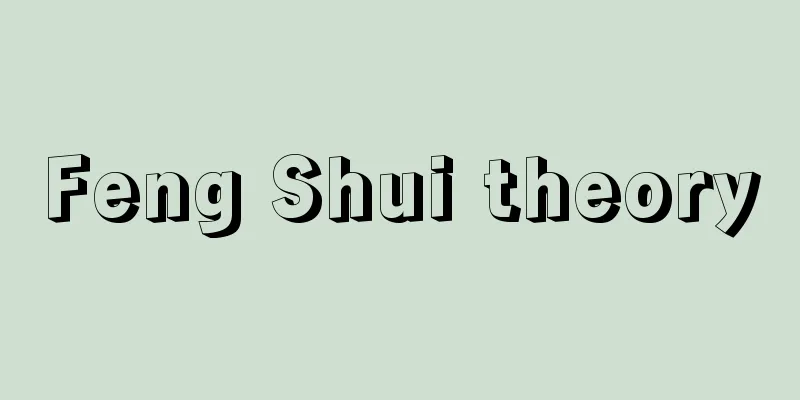Feng Shui theory

|
Feng Shui refers to a type of East Asian view of nature and the environment, and its unique method of judging and measuring the environment is called feng shui theory. It originated in ancient China and has influenced modern East Asia, Southeast Asia, and other regions. Its origins can be found in the Chinese divination of the Yin and Zhou dynasties, the geography and shangdang of the Zhou, Spring and Autumn, and Warring States periods, and the Kanyo of the Han dynasty. Feng Shui was defined in the Zongjing, a book supposedly written by the Jin dynasty scholar Guo Pu. Feng Shui refers to wind and water, and the geographical conditions that control the movement of energy. Depending on the era, it was called feng shui arts, shangdi arts, kandi study, and geography arts, and experts in judging it were called feng shui masters, geographers, onmyoji, jishi, and earth officials. In modern China, it is called feng shui masters, geography masters, yin and yang masters, and Nanbanzi, depending on the region. The characteristics of Feng Shui are: (1) that the environment has a strong influence on humans and the dead (ancestors), (2) that this influence is related to the natural environment, such as topography, water flow, climate, geology, and vegetation, and the movement of the universe, such as yin and yang, the five elements, the eight trigrams, and the balance of heaven, earth, and earth, and (3) that this influence manifests itself in the form of good and bad fortune for humans in the present world and future descendants. Therefore, if you want to receive positive effects from your environment, you need to create an environment and living space that secures the vital energy (life energy) that has a positive effect on humans and the dead, and removes the killing energy (killing energy) that has a negative effect. The objects of judgment can be broadly divided into two types: Yin House Feng Shui (cemetery Feng Shui, grave physiognomy) and Yang House Feng Shui (house Feng Shui, house physiognomy). After the spread of Feng Shui theory, Yin House Feng Shui came to be superior to Yang House Feng Shui, and Feng Shui theory usually refers to the judgment method of Yin House Feng Shui. Yang House Feng Shui can be broadly divided into interior Feng Shui and exterior Feng Shui that constitutes the exterior. Exterior Feng Shui can be further divided into community (city/village) Feng Shui and house Feng Shui (house physiognomy). In East Asian countries, Feng Shui judgment has often been implemented as a national policy. When building or relocating Chinese cities and royal tombs, Korean cities and royal tombs, and Okinawan cities and villages, bureaucrats often made judgments. Even today, grave physiognomy is important in various parts of East Asia, and it is said that the good or bad environment of the cemetery controls the good or bad fortune of descendants. It is explained that the prosperity, wealth, and longevity of descendants are all due to the influence of good Feng Shui in the cemetery. It is also believed that the Feng Shui of a house determines whether it will bring good or bad luck in a person's life in this world, and before a house is built, Feng Shui masters, as well as fortune tellers and shamans, are asked to judge the Feng Shui. [Yoshio Watanabe] "Feng Shui Thought and East Asia" by Watanabe Yoshio (1990, Jinbun Shoin)" ▽ "Feng Shui Essays" edited by Watanabe Yoshio and Miura Kunio (1994, Kaifusha)" ▽ "Considerations on Feng Shui Thought" by Makio Ryokai (1994, Yamakibo Butsuriin)" ▽ "Exploring the Sources of Feng Shui" by He Xiao-xin, translated by Miyazaki Junko (1995, Jinbun Shoin)" ▽ "Korean Feng Shui Thought" by Choi Chang-jo, translated by Kim Jae-ho and Shibuya Jin-myung (1997, Jinbun Shoin)" [Reference items] | | |Source: Shogakukan Encyclopedia Nipponica About Encyclopedia Nipponica Information | Legend |
|
風水とは東アジアにおける一種の自然観・環境観をさし、その独特な環境判断や測定術を風水説という。古代中国に発し、現代東アジア、東南アジアその他にも影響が及ぶ。中国殷(いん)周代の卜宅(ぼくたく)、周春秋戦国時代の地理・相宅、漢代の堪輿(かんよ)などにその淵源(えんげん)が求められる。風水が定義づけられたのは、晋(しん)代の文人郭璞(かくはく)の書だと仮託された『葬経(そうけい)』からである。風水とは風と水であり、気の動きを操作する地理的条件をいった。時代により風水術、相地術、堪輿学、地術などとよばれ、判断の専門家を風水師、地理師、陰陽師(おんみょうじ)、地師、地官などと称した。現代中国では地方により、風水先生、地理先生、陰陽先生、南蛮子などとよんでいる。 風水説の特徴は、(1)環境が人間や死者(祖先)に対して強い影響を及ぼすとすること、(2)その影響が地形、水流、気候、地質、植生などの自然環境と、陰陽(おんみょう)、五行、八卦(はっか)、天干地支などの宇宙の運行との相関性をもって及ぶとすること、(3)さらにその影響が、現世の人間や未来の子孫に対し吉凶禍福を伴って現れるとすることにある。したがって環境からの好影響を得たいのなら、死者や人間に好影響を与える気(生気)を確保して、悪影響を与える気(殺気)を除去する環境と生活空間を構築する必要がある。 判断の対象は、大別して陰宅風水(墓地風水、墓相)と陽宅風水(住宅風水、家相)の2種がある。風水説が普及してのちは陰宅風水が陽宅風水に優り、風水説といえば通常陰宅風水の判断法をいう。陽宅風水は室内インテリア風水と、外観を構成するエクステリア風水に2大別できる。エクステリア風水はさらにコミュニティ(都市・村落)風水と家宅風水(家相)に分けられる。東アジア諸国では、風水判断はしばしば国策として実施されてきた。中国の都市や陵墓など、韓国の都市や王陵など、沖縄の都市・村落などの建設立地や移動にあたっては、官僚による判断がたびたび実施された。また現代においても東アジア各地では墓相が重視され、墓地環境の好悪が子孫の禍福を支配するものとされる。子孫の繁栄・財力の豊かさ、長寿はみな、墓地の好風水の影響によるものだと説明される。また家相は現世の人間生活の禍福を左右すると考えられており、家屋の建設前に風水師のほか易者やシャーマンまでが、依頼に応じて風水を判断している。 [渡邊欣雄] 『渡邊欣雄著『風水思想と東アジア』(1990・人文書院)』▽『渡邊欣雄・三浦國雄編『風水論集』(1994・凱風社)』▽『牧尾良海著『風水思想論考』(1994・山喜房仏書林)』▽『何暁昕著、宮崎順子訳『風水探源』(1995・人文書院)』▽『崔昌祚著、金在浩・渋谷鎮明訳『韓国の風水思想』(1997・人文書院)』 [参照項目] | | |出典 小学館 日本大百科全書(ニッポニカ)日本大百科全書(ニッポニカ)について 情報 | 凡例 |
Recommend
Afinogenov, Aleksandr Nikolaevich
Born: April 4, 1904. Skopin, Ryazan [Died] October...
Fixed - Kogen
In ancient times, when important national events o...
Cabinet Minister - Kakuryo
The ministers who make up the cabinet. Cabinet mem...
Soft Chancre
[What kind of disease is it?] It is a sexually tra...
Subcutaneous fat
A layer of fat that develops just beneath the surf...
Omaezaki Plateau
...The plateau is divided into three levels, but ...
Coccoroba (English spelling) sea grape
A shrub of the Polygonaceae family native to the W...
Mersenne, Marin
Born: September 8, 1588, Oase Died September 1, 16...
Idas (English spelling)
Hero of Greek mythology. Son of Aphareus, close to...
Forensic photograph - forensic photograph
Photographs used for appraisal in the legal, artis...
The Miyoshi Trio
Three Miyoshi clan members made up the Miyoshi go...
Vertical take-off and landing aircraft (VTOL)
An aircraft capable of vertical take-off and landi...
Cantonese dialect - Etsuhogen
…The semantic evocation of romanized spelling, ev...
Shionomisaki meeting - Shionomisaki meeting
A meeting was held at Misaki Shrine by the local f...
Moorcroft, W. (English spelling) MoorcroftW
...In particular, in the 19th century, Russia aim...









